Abstract
The responses of plasma aldosterone, cortisol, and corticosterone to an infusion of 75 mEq of potassium chloride over 120 min were studied in 10 normal subjects. Five subjects were fed a 10 mEq and five a 200 mEq sodium diet, while all subjects ingested 40 mEq and 200 mEq potassium sequentially. Two potassium infusions were performed in each subject when in balance on a fixed sodium intake and low and then high potassium diets.
Regardless of dietary intake, increases of serum potassium of 0.5-1.5 mEq/liter above preinfusion levels were usually associated with significant increments in plasma aldosterone concentration. Our data agree with previous evidence that the potassium ion stimulates the adrenal cortex directly to secrete aldosterone. Peripheral renin activity did not increase after the potassium infusion. Plasma cortisol and corticosterone levels generally followed the expected diurnal decline during the infusion, implying that ACTH secretion did not increase.
The plasma aldosterone response to incremental changes in serum potassium was linear on each of the four diets. The slopes of these linear relationships increased significantly when the potassium intake was increased from 40 to 200 mEq. No increase in slope occurred on either potassium intake when dietary sodium was restricted from 200 to 10 mEq. Thus, identical increases in serum potassium were associated with greater increments in plasma aldosterone above preinfusion levels on either sodium intake when the 200 mEq potassium diet was compared with the 40 mEq potassium intake.
Full text
PDF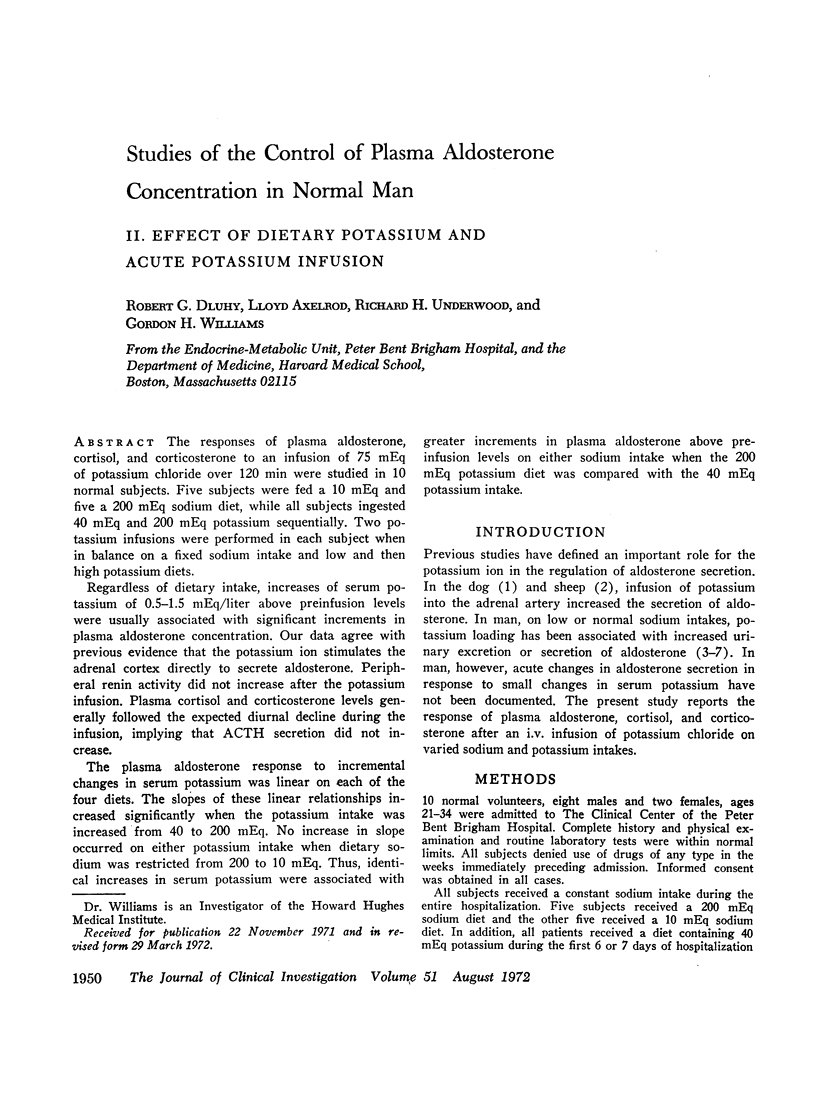
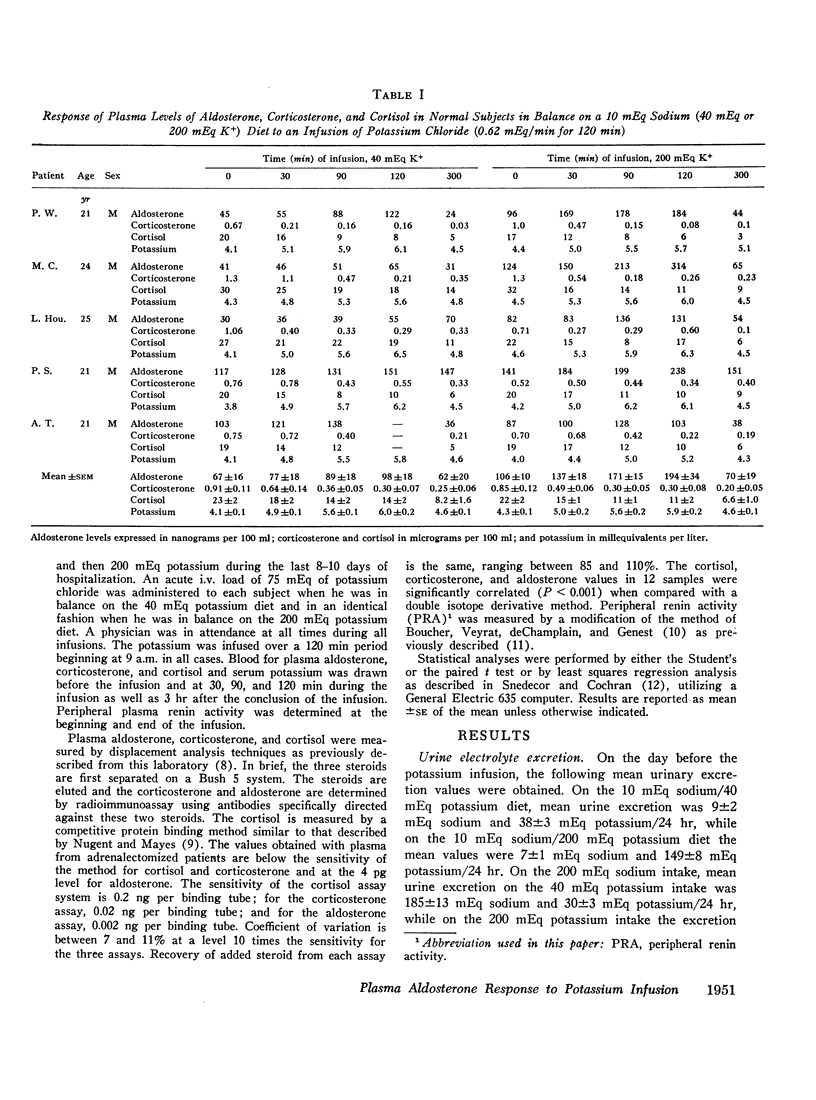
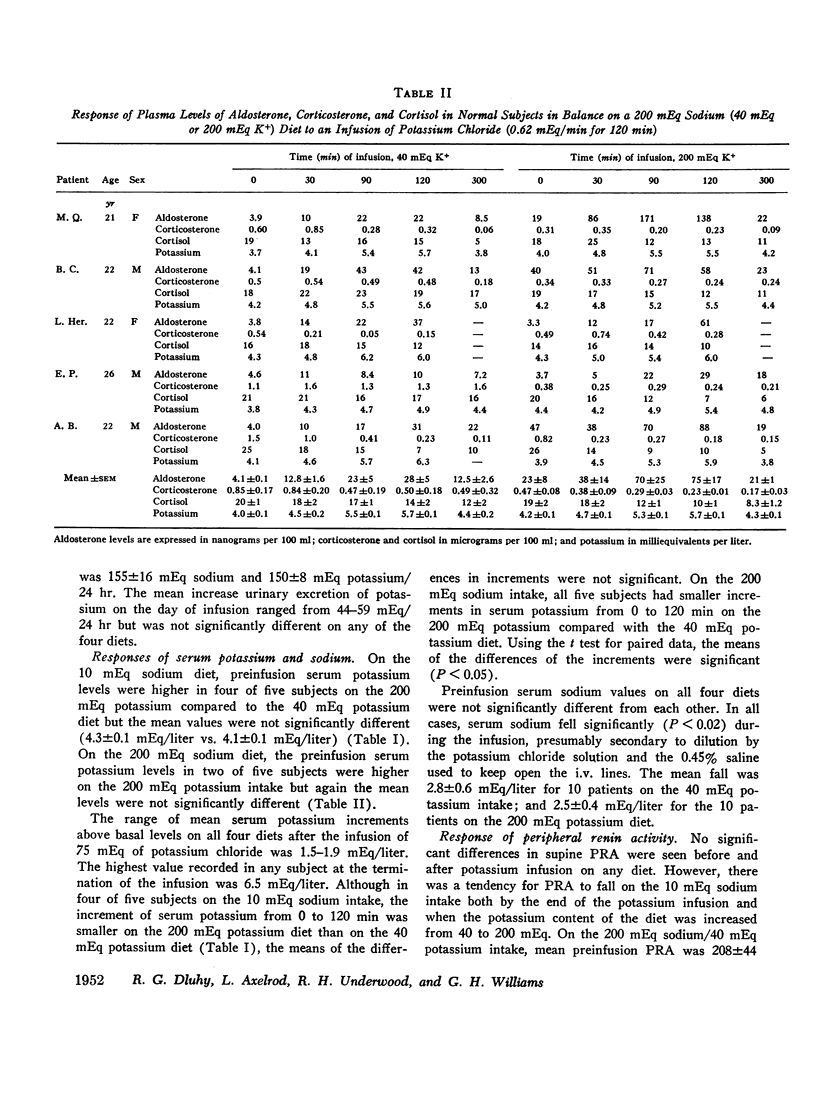
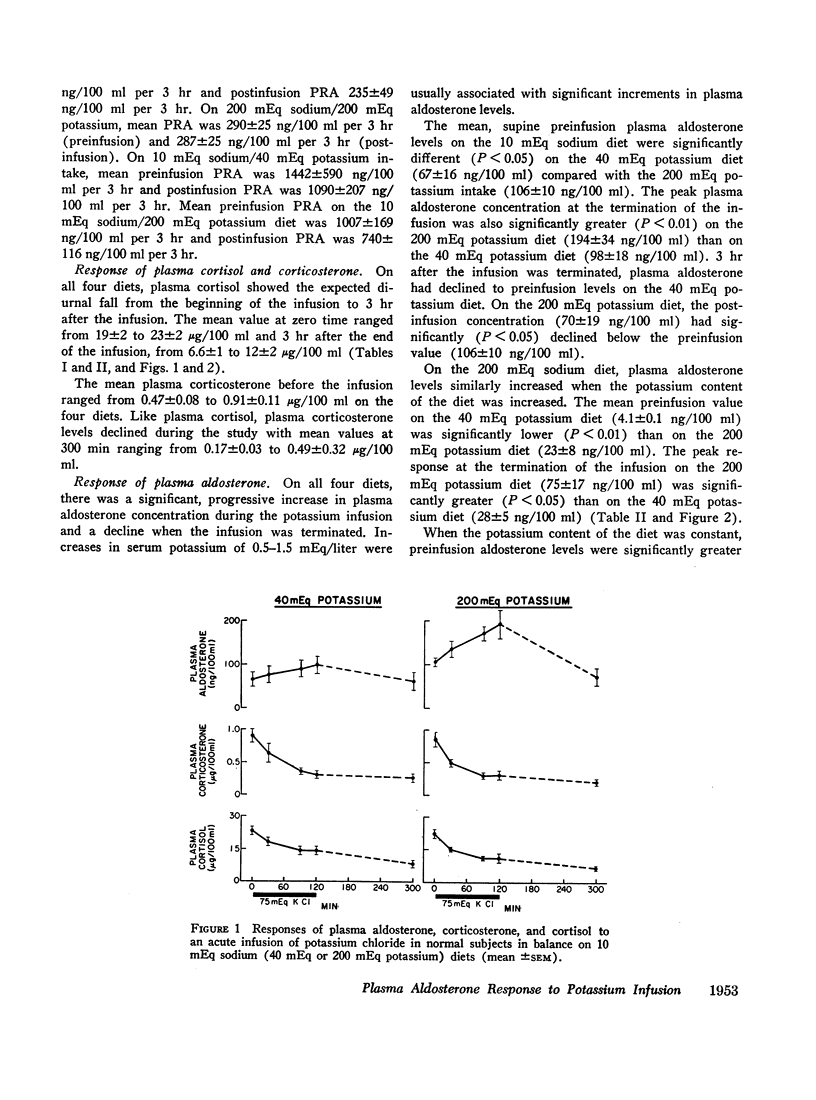
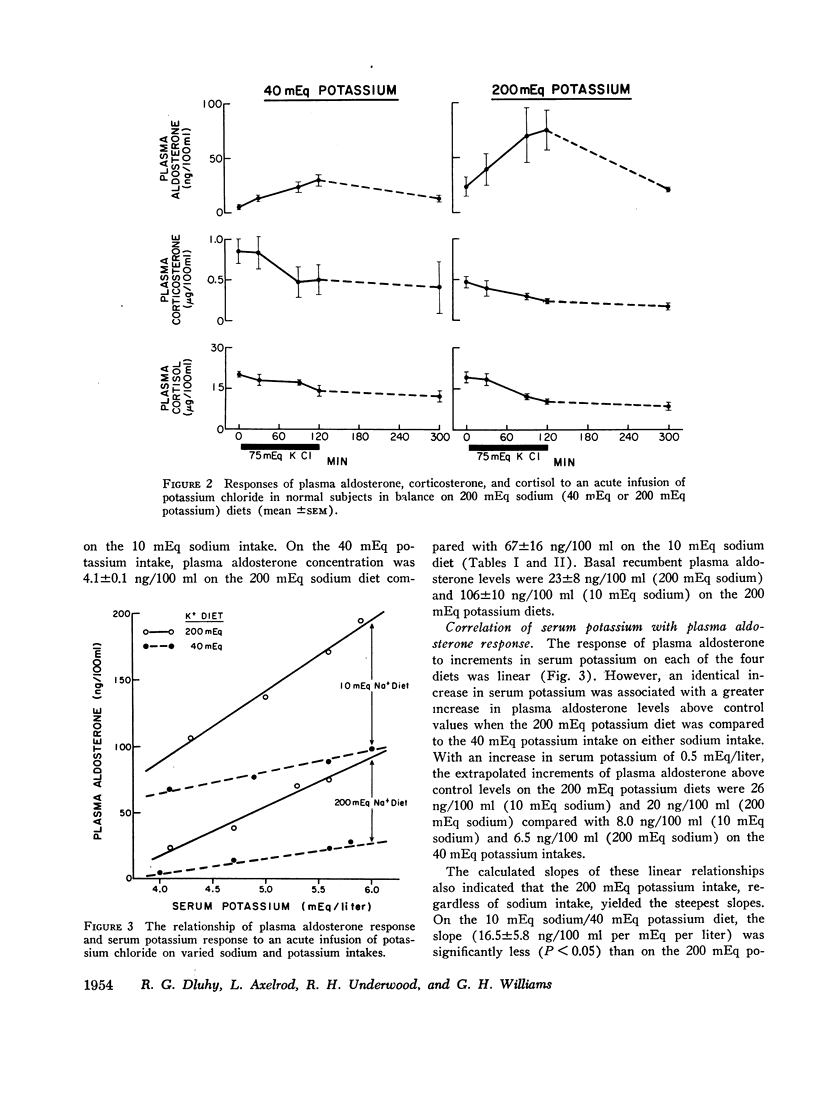
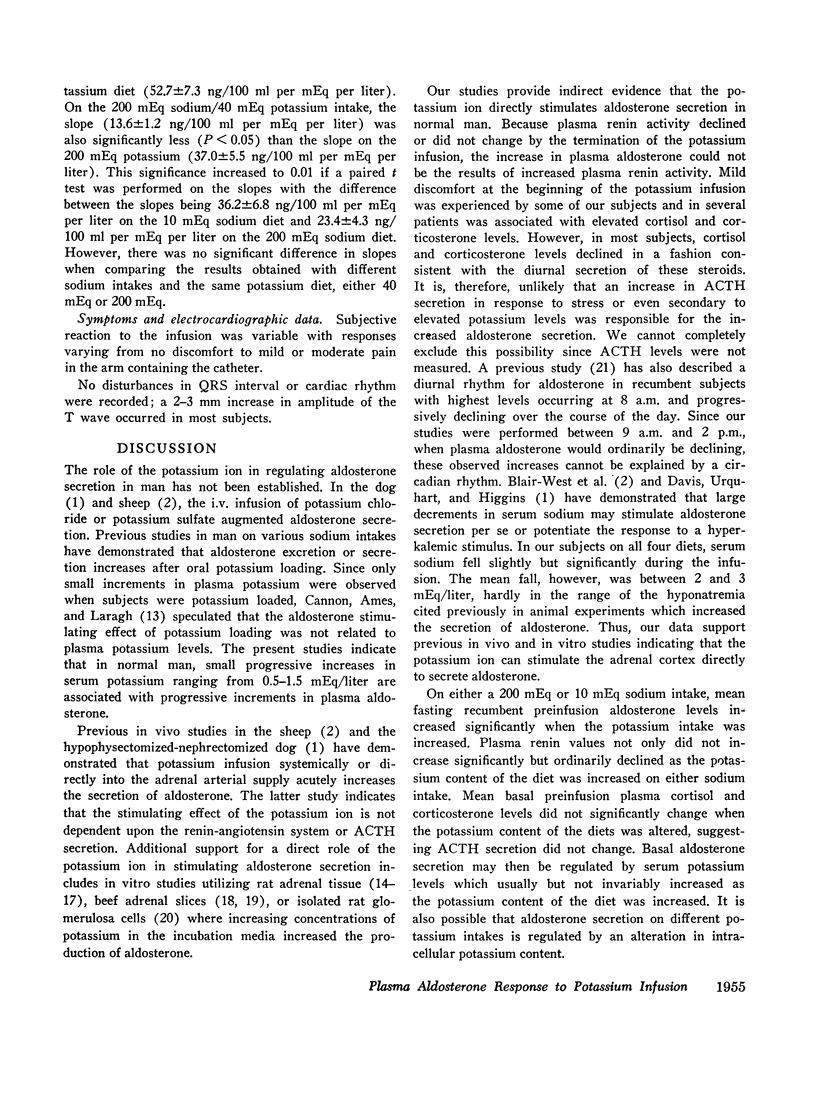
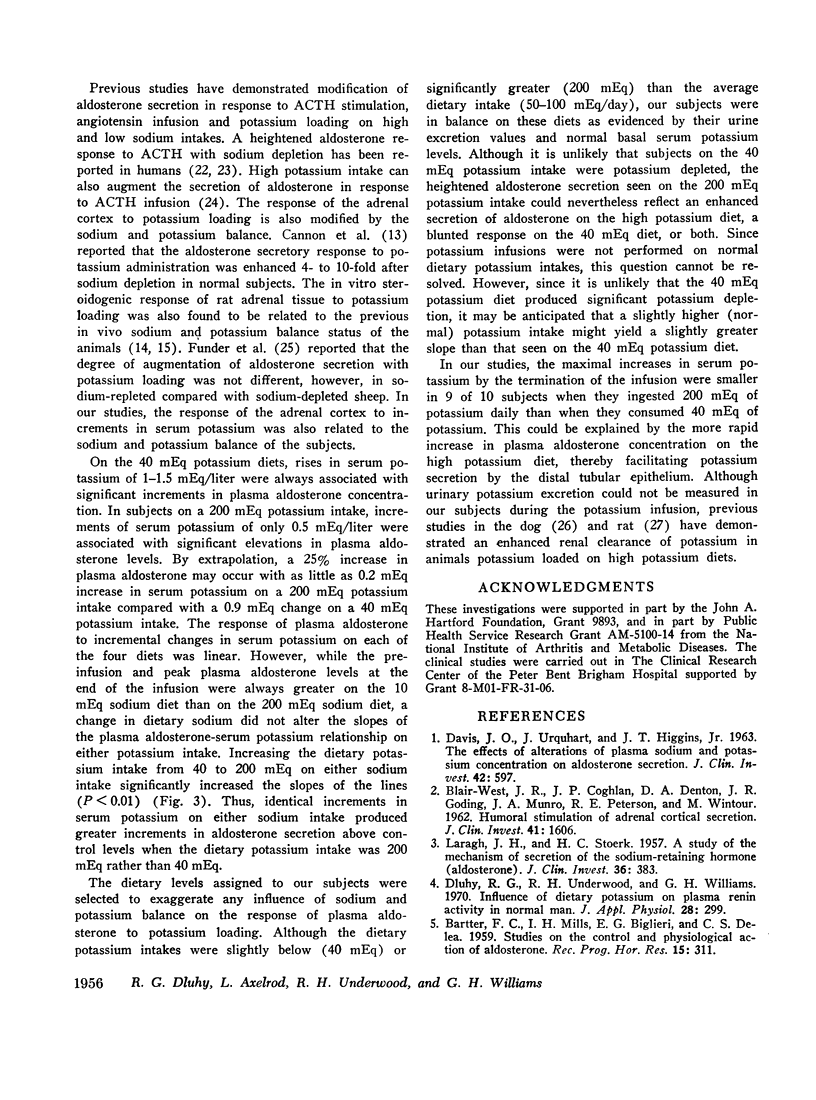
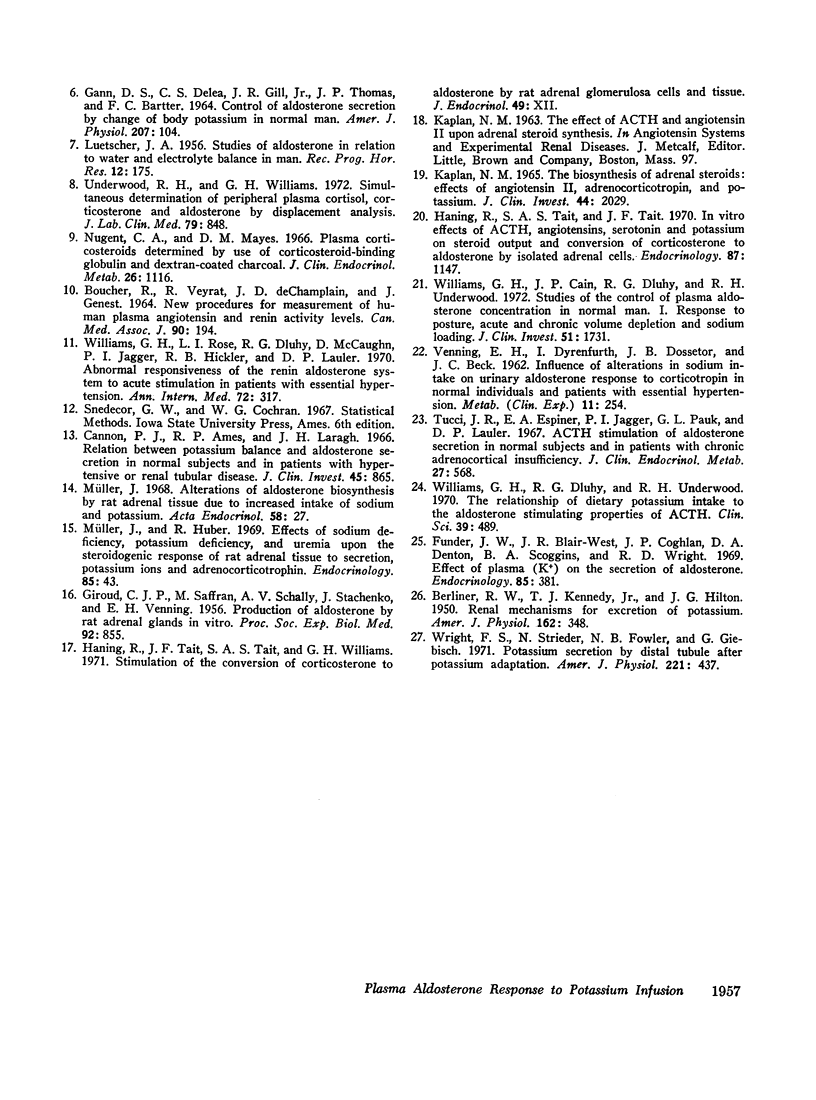
Selected References
These references are in PubMed. This may not be the complete list of references from this article.
- BERLINER R. W., KENNEDY T. J., Jr, HILTON J. G. Renal mechanisms for excretion of potassium. Am J Physiol. 1950 Aug 1;162(2):348–367. doi: 10.1152/ajplegacy.1950.162.2.348. [DOI] [PubMed] [Google Scholar]
- BLAIR-WEST J. R., COGHLAN J. P., DENTON D. A., GODING J. R., MUNRO J. A., PETERSON R. E., WINTOUR M. Humoral stimulation of adrenal cortical secretion. J Clin Invest. 1962 Aug;41:1606–1627. doi: 10.1172/JCI104619. [DOI] [PMC free article] [PubMed] [Google Scholar]
- BOUCHER R., VEYRAT R., DE CHAMPLAIN J., GENEST J. NEW PROCEDURES FOR MEASUREMENT OF HUMAN PLASMA ANGIOTENSIN AND RENIN ACTIVITY LEVELS. Can Med Assoc J. 1964 Jan 25;90:194–201. [PMC free article] [PubMed] [Google Scholar]
- Cannon P. J., Ames R. P., Laragh J. H. Relation between potassium balance and aldosterone secretion in normal subjects and in patients with hypertensive or renal tubular disease. J Clin Invest. 1966 Jun;45(6):865–879. doi: 10.1172/JCI105402. [DOI] [PMC free article] [PubMed] [Google Scholar]
- DAVIS J. O., URQUHART J., HIGGINS J. T., Jr The effects of alteration of plasma sodium and potassium concentration on aldosterone secretion. J Clin Invest. 1963 May;42:597–609. doi: 10.1172/JCI104750. [DOI] [PMC free article] [PubMed] [Google Scholar]
- Dluhy R. G., Underwood R. H., Williams G. H. Influence of dietary potassium on plasma renin activity in normal man. J Appl Physiol. 1970 Mar;28(3):299–302. doi: 10.1152/jappl.1970.28.3.299. [DOI] [PubMed] [Google Scholar]
- Funder J. W., Blair-West J. R., Coghlan J. P., Denton D. A., Scoggins B. S., Wright R. D. Effect of (K+) on the secretion of aldosterone. Endocrinology. 1969 Aug;85(2):381–384. doi: 10.1210/endo-85-2-381. [DOI] [PubMed] [Google Scholar]
- GANN D. S., DELEA C. S., GILL J. R., Jr, THOMAS J. P., BARTTER F. C. CONTROL OF ALDOSTERONE SECRETION BY CHANGE OF BODY POTASSIUM IN NORMAL MAN. Am J Physiol. 1964 Jul;207:104–108. doi: 10.1152/ajplegacy.1964.207.1.104. [DOI] [PubMed] [Google Scholar]
- GIROUD C. J., SAFFRAN M., SCHALLY A. V., STACHENKO J., VENNING E. H. Production of aldosterone by rat adrenal glands in vitro. Proc Soc Exp Biol Med. 1956 Aug-Sep;92(4):855–859. doi: 10.3181/00379727-92-22635. [DOI] [PubMed] [Google Scholar]
- Haning R., Tait S. A., Tait J. F. In vitro effects of ACTH, angiotensins, serotonin and potassium on steroid output and conversion of corticosterone to aldosterone by isolated adrenal cells. Endocrinology. 1970 Dec;87(6):1147–1167. doi: 10.1210/endo-87-6-1147. [DOI] [PubMed] [Google Scholar]
- Kaplan N. M. The biosynthesis of adrenal steroids: effects of angiotensin II, adrenocorticotropin, and potassium. J Clin Invest. 1965 Dec;44(12):2029–2039. doi: 10.1172/JCI105310. [DOI] [PMC free article] [PubMed] [Google Scholar]
- LARAGH J. H., STOERK H. C. A study of the mechanism of secretion of the sodium-retaining hormone (aldosterone). J Clin Invest. 1957 Mar;36(3):383–392. doi: 10.1172/JCI103434. [DOI] [PMC free article] [PubMed] [Google Scholar]
- LUETSCHER J. A., Jr Studies of aldosterone in relation to water and electrolyte balance in man. Recent Prog Horm Res. 1956;12:175-84; discussion, 184-98. [PubMed] [Google Scholar]
- Müller J. Alterations of aldosterone biosynthesis by rat adrenal tissue due to increased intake of sodium and potassium. Acta Endocrinol (Copenh) 1968 May;58(1):27–37. [PubMed] [Google Scholar]
- Müller J., Huber R. Effects of sodium deficiency, potassium deficiency and uremia upon the steroidogenic response of rat adrenal tissue to serotonin, potassium ions and adrenocorticotropin. Endocrinology. 1969 Jul;85(1):43–49. doi: 10.1210/endo-85-1-43. [DOI] [PubMed] [Google Scholar]
- Nugent C. A., Mayes D. M. Plasma corticosteroids determined by use of corticosteroid-binding globulin and dextran-coated charcoal. J Clin Endocrinol Metab. 1966 Oct;26(10):1116–1122. doi: 10.1210/jcem-26-10-1116. [DOI] [PubMed] [Google Scholar]
- Tucci J. R., Espiner E. A., Jagger P. I., Pauk G. L., Lauler D. P. ACTH stimulation of aldosterone secretion in normal subjects and in patients with chronic adrenocortical insufficiency. J Clin Endocrinol Metab. 1967 Apr;27(4):568–575. doi: 10.1210/jcem-27-4-568. [DOI] [PubMed] [Google Scholar]
- Underwood R. H., Williams G. H. The simultaneous measurement of aldosterone, cortisol, and corticosterone in human peripheral plasma by displacement analysis. J Lab Clin Med. 1972 May;79(5):848–862. [PubMed] [Google Scholar]
- VENNING E. H., DYRENFURTH I., DOSSETOR J. B., BECK J. C. Influence of alterations in sodium intake on urinary aldosterone response to corticotropin in normal individuals and patients with essential hypertension. Metabolism. 1962 Feb;11:254–264. [PubMed] [Google Scholar]
- Williams G. H., Cain J. P., Dluhy R. G., Underwood R. H. Studies of the control of plasma aldosterone concentration in normal man. I. Response to posture, acute and chronic volume depletion, and sodium loading. J Clin Invest. 1972 Jul;51(7):1731–1742. doi: 10.1172/JCI106974. [DOI] [PMC free article] [PubMed] [Google Scholar]
- Williams G. H., Dluhy R. G., Underwood R. H. The relationship of dietary potassium intake to the aldosterone stimulating properties of ACTH. Clin Sci. 1970 Oct;39(4):489–496. doi: 10.1042/cs0390489. [DOI] [PubMed] [Google Scholar]
- Williams G. H., Rose L. I., Dluhy R. G., McCaughn D., Jagger P. I., Hickler R. B., Lauler D. P. Abnormal responsiveness of the renin aldosterone system to acute stimulation in patients with essential hypertension. Ann Intern Med. 1970 Mar;72(3):317–326. doi: 10.7326/0003-4819-72-3-317. [DOI] [PubMed] [Google Scholar]
- Wright F. S., Strieder N., Fowler N. B., Giebisch G. Potassium secretion by distal tubule after potassium adaptation. Am J Physiol. 1971 Aug;221(2):437–448. doi: 10.1152/ajplegacy.1971.221.2.437. [DOI] [PubMed] [Google Scholar]


